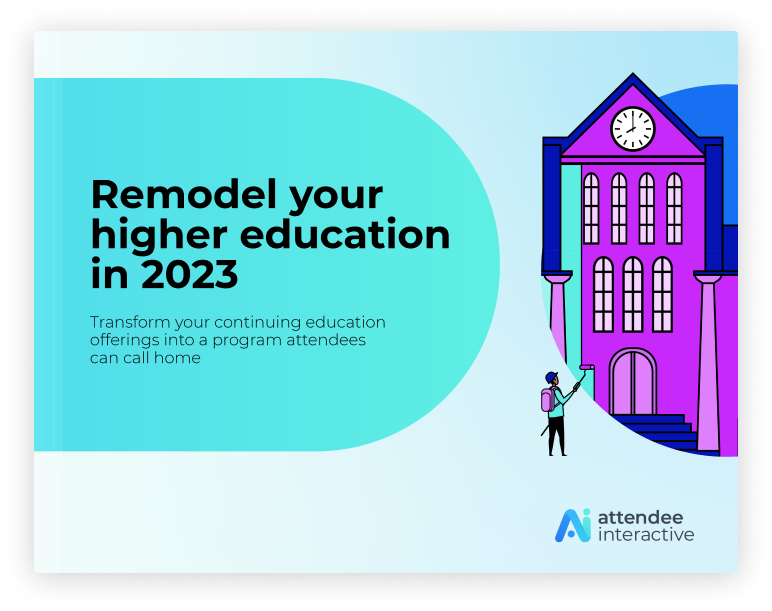Importance of Continuing Education
The headlines are coming in all over the country: the Great Resignation is still in full swing. Over four million workers left their jobs in January, a trend that albeit is slowing, shows no signs of stopping anytime soon. The big question on employers’ and economists’ minds alike is “why?”
As you can imagine, the answer is quite nuanced, and varies from industry to industry. Some professions are feeling largely undervalued, while others feel overworked. Some are understaffed and underpaid. But one very clear trend to take note of is that the largest resigning demographic are 30–45-year-olds in mid-career positions who are rethinking their life and career goals.
So, what does all of this have to do with continuing education? While millions of Americans are leaving their jobs, enrollment in continuing education for adults has been increasing. What does that mean exactly? First, it should be addressed that most Americans are not quitting their jobs simply to retire early. They are leaving unfulfilling roles in exchange for more fulfilling career options. Second, it follows that an increase in continuing education enrollment means that the workforce is looking for ways to better themselves. Whether they are switching industries, career levels, or opting for more challenging roles, continuing education is playing a significant role in how professionals are navigating the workforce.
Continuing education programs are aimed at facilitating professional growth and can range from new skill development to current skill refinement. This can be conducted in several formats. The most common continuing education programs offer completion in the form of certificates or maintenance credits. The good news is there are countless online programs offering flexible certificate-based courses to choose from. But how do you choose the right continuing education (CE) program for you? What should you look for in a CE program?
This guide breaks down the quintessential qualities to look for when considering CE programs. Whether you want to switch careers or simply advance your current role, you want to be sure you are investing your learning in a program that will produce the most value for your time. Continue reading for tips on how to select the best continuing education program.
Choosing Continuing Education Courses
 This may seem like an obvious first step, but it is important to ask yourself what exactly you are seeking to learn. You may discover that after researching different programs, you decide on something else entirely.
This may seem like an obvious first step, but it is important to ask yourself what exactly you are seeking to learn. You may discover that after researching different programs, you decide on something else entirely.
Look for a program that offers diverse course offerings in the field you are interested in. For example, some programs are dedicated to specific industries like medical, legal, or technology fields. Just as important, be sure that they offer advanced courses or related courses that you can take in the future. In other words, don’t start at the top of the ceiling; make sure there is room for growth in your academic journey.
The best way to accomplish this step is to write down what your career and academic objectives are. Make a list of your wants and needs, and then start researching different programs. As you research, make note of any interesting courses that pique your interest, even if they deviate from your original goals. Once you have begun to home in on certain programs, revisit your initial objectives. After you align these goals, needs and interests, you should have a clear picture of what you are looking for in a continuing education program’s course offerings.
Look for Flexible Options
When it comes to continuing education as an adult, it is already understood how many other responsibilities you must uphold. Many adult learners are already full-time workers, parents, partners, etc. Gone are the days of needing to enroll in night school, forcing your schedule to work around a rigid in-person curriculum. Thankfully, most programs are held entirely online and offer multiple course schedules to better fit your life.
When examining a program’s course schedule, look for:
- Classes held in multiple scheduling formats:
Meaning that a course is not offered in just one option, e.g., Juggling 101 is offered with video instruction on Mondays and Wednesdays, as well as Tuesday and Thursdays. - Rolling admissions:
This means you may enroll at any time, instead of waiting to apply for a strict Fall or Spring semester - “Learn as you go” courses:
These courses are completely self-paced and may be conducted at any time of day, as quickly or slowly as you decide. Any video content is pre-recorded, and you typically do not have a designated instructor.
You know what your schedule can or cannot support, so keep your existing responsibilities in mind when making your CE program commitments. Time management will be your best tool, no matter which program you choose!
Affordability & Payment Options for Courses
The price tag on your program of choice may be the most crucial factor of all. Not everyone can afford premium prices, and not everyone is eligible for scholarships. However, there are both affordable continuing education programs, and there are funding and scholarship opportunities made specifically for mid-career adults.
Another factor to consider is whether your current employer offers free or incentivized continuing education opportunities. Depending on your industry, it could be required for you to secure continuing education or maintenance credits to continue holding your license. In these instances, it is common for employers to offer assistance in your continuing education journey.
If you know you are going to be paying for your CE yourself, then conduct a price comparison of several programs that offer the kinds of courses you are looking for. The next thing to look for is their payment options. Does the program require the full amount upfront? Are there deposit requirements? Do they allow scaled payment plans? Determine what works for your budget and consider discussing financing options with your prospective program.
Interactivity
Everyone learns differently. For example, some learners need to hear the information read to them. Others need it shown to them, while others need a combination of senses engaged in order to retain the information. Consequently, distance learning does pose some disadvantages to those who are more hands-on, or who need a distraction-free environment.
Luckily, online learning has progressed in recent years, especially after the pandemic forced most in-person learning to adapt to remote environments. Classrooms, courses, and entire universities are discovering how to better serve their online students. Because of this, interactivity for online classrooms has significantly improved.
Look for courses with interactive videos and texts, video and group chats, and the use of technology. Find a program that fits your learning style. After all, the last thing you want is to pay for courses you cannot connect with and find yourself struggling with the material at hand.
Course Ratings & Reviews
 Next to look for in a CE program is how well it is reviewed. Professional ratings are useful in order to gauge how well respected or reputable the program is. But emphasis should also be placed on reviews by your peers.
Next to look for in a CE program is how well it is reviewed. Professional ratings are useful in order to gauge how well respected or reputable the program is. But emphasis should also be placed on reviews by your peers.
What are fellow colleagues saying about this program? Was it effective for them? It is always a good idea to look at the best and worst reviews to determine which ones seem to be standard and which ones are unusual circumstances. Reviews are powerful insights into a typical user’s genuine experience, but take caution, as they can sometimes exaggerate the pros or cons.
Look for Networking Opportunities
Even though you may be seeking an independent, “learn as you go” classroom experience, does not mean you aren’t also looking to build your professional network. Sure, you’re not looking to rush for a sorority or fraternity, but professional networking opportunities are extremely valuable. Some continuing education programs are supported by professional associations that you might want to be a member of. Others simply host networking forums that allow you to connect with other students and exchange contact information.
Additionally, be on the lookout for any mentorship programs. Finding a mentor for your professional and academic development is incredibly beneficial. Mentors can help guide you throughout your career, provide letters of recommendation, or even play a role in promoting or hiring you.
Job Placement and Career Counseling
In addition to the importance of peer networking and mentorships, assistance with job placement is a quality that cannot be overestimated. Some programs may go as far as offering training or webinars for how to navigate the job-hunting process. Many offer resume reviews and resources to refine all your hiring materials.
See if your desired program offers a career forum or job-posting service. Further, do they offer career counseling support? This can be a substantial resource when navigating the job-hunting process. If you too have been part of the great resignation, then any added resources to help guide you toward your next role are invaluable.
Putting it all together
You are a continuous learner and have many needs when it comes to advancing your professional and academic needs. Therefore, it is imperative to choose your continuing education program so carefully and conduct your due diligence. Does your chosen program align with your overarching career goals? Is it offered in a flexible format that suits your needs? Is it affordable? Finally, does it offer interactive courses that are well reviewed, and does it also offer networking and recruiting opportunities? These are the most important questions to ask yourself when selecting the best continuing education program for yourself.
It is also important to note that not every program will offer every single one of these qualities. The point of this guide is to help you determine which of these qualities matter most to you and your career objectives. This will allow you to make a more informed decision that will lead to the highest return on investment of your continued education.
Whether you are seeking to gain new skills, refining or updating current skills, or adding supplementary knowledge to your skill base, you know that continuing education is the path for you. And you are not alone. Millions of Americans are taking the plunge and going after the careers they want instead of the careers they settled for. And it has been made abundantly clear that in such a competitive job market, any additional learning courses, certificates, or credits can be the difference in securing your job interview.
Good luck finding the best continuing education program, and congratulations on making the decision to advance your career.
Are you a continuing education provider?
Professional organizations and associations that host CE courses hold the challenging task of offering all these incredibly high standards of quality. Does your association host conferences to support this continued learning? Then you need a content system that can support CE credits as well as conference management.
Attendee Interactive is a powerful and dynamic event management software that promotes attendee learning with a convenient and reliable continuing education platform. With Attendee Interactive, you can be sure that attendees can quickly claim, view, and manage their CE credits by logging into the platform and locating their event.
Additionally, your association’s event administrators can create overall course evaluations or session specific evaluations to promote attendee learning. Furthermore, users have access to their own intuitive web portal to claim CE credits, take pre/post-tests, manage enduring materials, and more.



